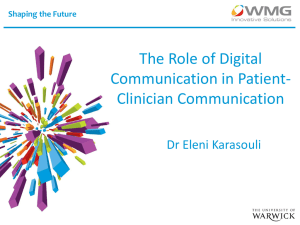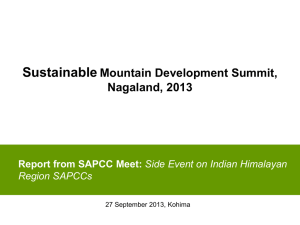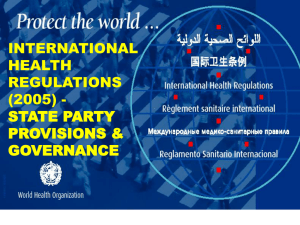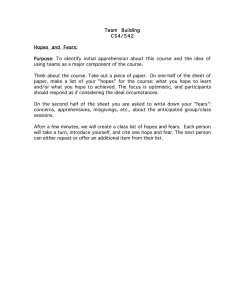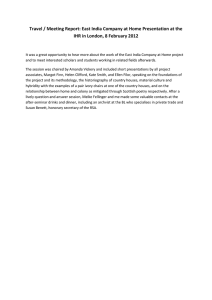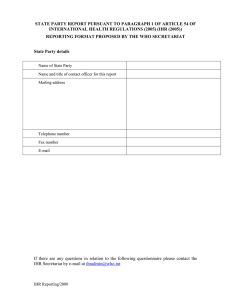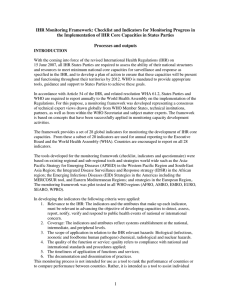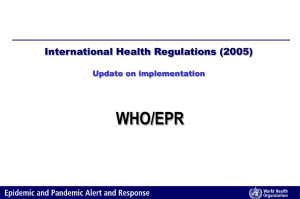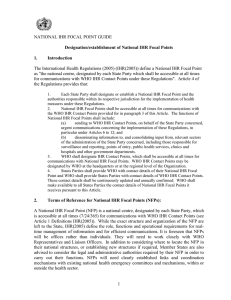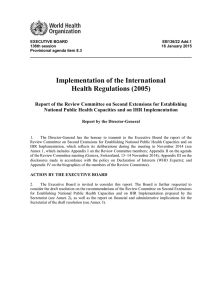Abstract Submission to Integrated Health Records (IHR) Workshop: "Practice and Technology"
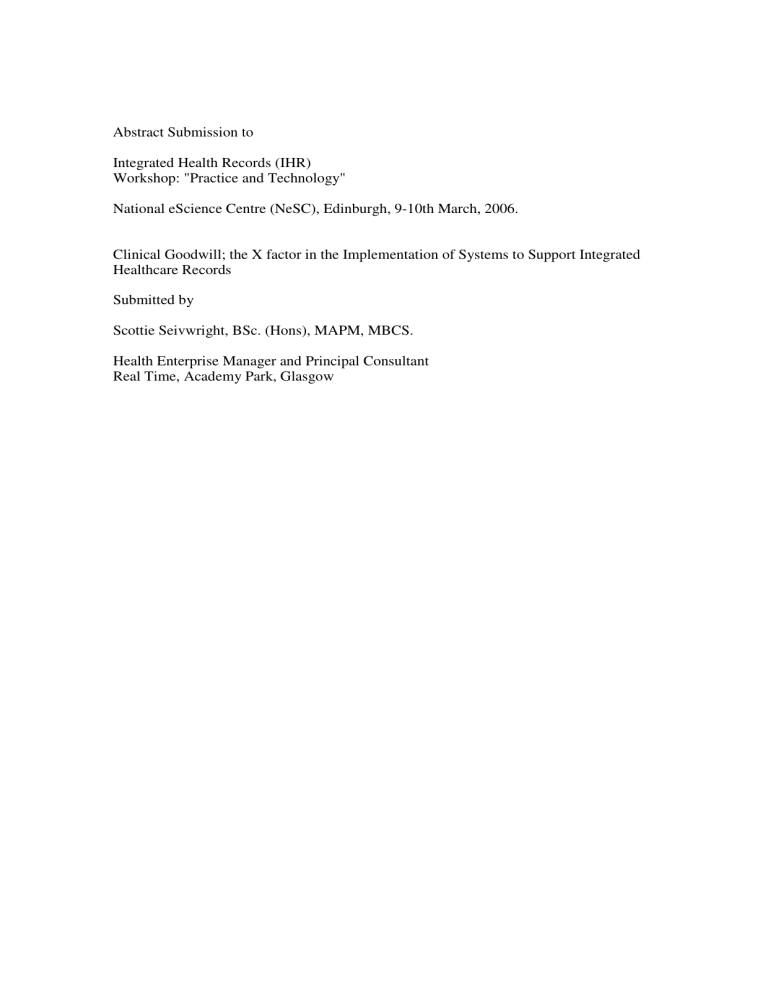
Abstract Submission to
Integrated Health Records (IHR)
Workshop: "Practice and Technology"
National eScience Centre (NeSC), Edinburgh, 9-10th March, 2006.
Clinical Goodwill; the X factor in the Implementation of Systems to Support Integrated
Healthcare Records
Submitted by
Scottie Seivwright, BSc. (Hons), MAPM, MBCS.
Health Enterprise Manager and Principal Consultant
Real Time, Academy Park, Glasgow
Clinical Goodwill; the X factor in the implementation of systems to support Integrated Health Records
In 2006 there will be an unprecedented expenditure on the provision and replacement of
ICT systems for healthcare in the UK. This spending has been targeted to aid the NHS in the healthcare reforms and the improvement of patient journeys and outcomes. Integrated
Health Records are viewed as an opportunity to improve the provision of healthcare services through records being:-
• Available universally (where appropriate);
• Invulnerable to accidental loss;
• Cleanly, available at point of treatment;
• A more flexible way to access data;
• Available for multiple simultaneous access;
• Available to patients for accuracy checks;
• Open to audits, and access checks;
• Available to support confidential multidisciplinary reviews;
• Incorporated into Decision Support Systems (i.e. Map of Medicine);
• Secondary uses of pseudo-anonymous data sets.
In addition to this, complete, accurate and large volumes of data on patients, their history, their pathology and their outcomes will build a hugely powerful knowledge tool. The
IHR will be one of the largest medical data repository in the world. As is anticipated, if in the future this information also integrates with individuals genetic maps we should be on the verge of taking the next step in the creation of the next generation of tailored medical treatments. This will allow for the creation of drug types and treatments for the individual and not the general population as happens now. Creating medicines that will work for you but not necessarily your wife or your neighbour. These new medicines could bring about significant increases in effectiveness of treatment.
Therefore, the actual implementation of systems to create and support national Integrated
Health Records are of vital importance to all stakeholders in world health. patients, clinicians, health sector workers, academia, politicians, and ICT system suppliers need to identify the higher goal and work in partnership to ensure that these systems happen. This should be a simple enough task however like the blind man’s elephant all partners to the
IHR see it as a different beast. This is leading to a situation where the politics around implementation are potentially stalling good inter agency co-operation.
Examining some of the motives around this has thrown up several interesting world views and these can be expressed in terms of goals and fears. The following table shows these;
Stakeholder
The Government
Patients
Hopes
Improved health care
Improved and modernised NHS
Better Outcomes to
Treatment
Fears
Wasting public money
Alienating the public
Inappropriate access to records
Power
They have agreed deal of power as they are paying for the systems
They can also put policy implementation targets on heath sectors to achieve roll-out
If individual cases start to go wrong they will sue and raise public concerns
Huge power to block or halt systems or practices that they fear
GPs
Secondary Care
Clinicians
Better Patient Care access to better medicines less paperwork
Information available when they need it
Better quality data
More Work being done in surgeries (data capture)
Misuse of their patient data
Loss of ownership of patient data
Losing the systems that they like
Worried about changes in working practices and also the flow of patients to ISTCs
Systems will be restricted or partially completed.
Medium but can be vocal through their
Royal Societies and
Colleges
Medical Research
Organisations
Access to much better sources of data
Building better medicines to treat people
ICT System suppliers Ability to create world class systems
Ability to make a sustainable profit
Too many changes will slow implementation
No clear customer or consensus on how IHR will be achieved
Small level of power and influence on how individual practices and trusts adopt IHR
Small, they will just support the terms of references that they have been given
This stakeholder analysis is very useful as it shows that everyone has different hopes and fears for the system and that all parties have different levels of influence. This being the case there is a danger that the main protagonists who have differing hopes and fears will engage in some level of conflict. Although each of the groups has a continuum of views with radical and conservative forces in each, ultimately the clinical view could be expressed on a whole as cautious and the government approach as bullish.
If these two parties find reason to go into conflict the vision of IHR will suffer. One of the clear ways this could happen is through the fear that these new systems are being mandated and not created through clinical need. Participation in decisions, specifications and acceptance of systems will help build clinical goodwill. Similarly drawing everyone into the large vision for the future benefits from IHRs will build a common trust that the
right things are being done for the right reasons. These things will build clinical
Goodwill!
In looking at the effects of clinical goodwill it is important to look at its impact on projects. These can be linked to the outcome of projects. Very successful projects in the
NHS have enjoyed clear clinical goodwill. The printing of prescriptions being an obvious example. Projects which have been difficult to find acceptance or that have changed their scope mid-way are usually the ones with marginal clinical support and the projects that have been postponed or had very poor up-take are the ones that have had clinical resentment attached.
So to ensure that the new systems to support IHR work and are adopted a new flexible approach to clinical participation needs to be brought to the fore. Engagement with all levels of healthcare professionals and their representative bodies needs to take place.
Commercial confidentiality concerns or confusion over who the ultimate customer is in the systems cannot be used to block widespread clinical participation and a true partnership contract between clinicians and health systems providers needs to be struck.
Many of the current procurement vehicles do not allow for enough wide scale participation and indeed appear to be exclusive or secretive.
Clinical Goodwill is of vital importance to the provision of healthcare systems in
Scotland as we move towards single patient records to ensure that a UK perspective is maintained and that all clinicians feel that sensible, safe systems that they can support are put in place. This will be done through renewed consultation and participation in the specification, design and delivery of these systems. There will be a challenge to deliver good systems to sensible cost that also have a degree of transparency which the clinical profession can feel comfortable with. Failure to do this in 2006 will lead to problems or acceptance and confidence at later stages of the delivery of all ICT clinical systems in the
UK.
